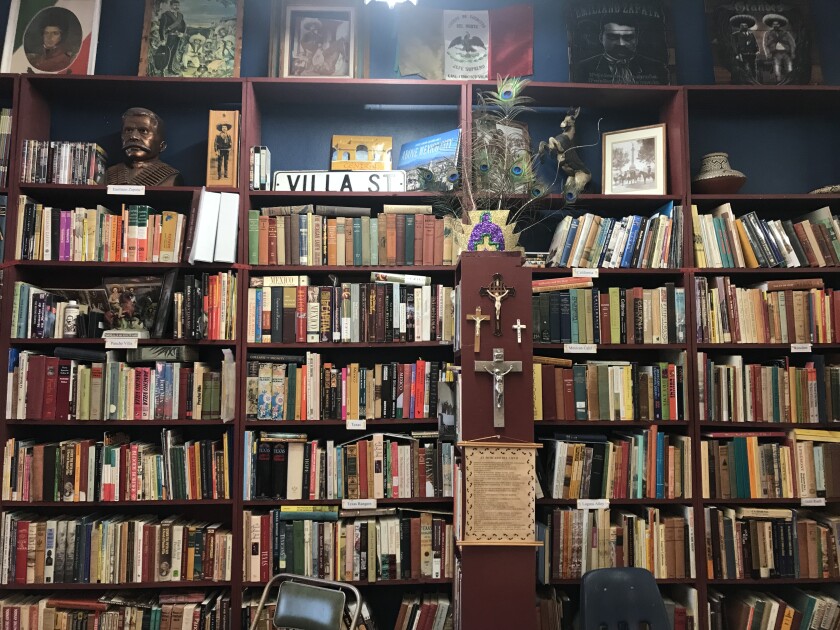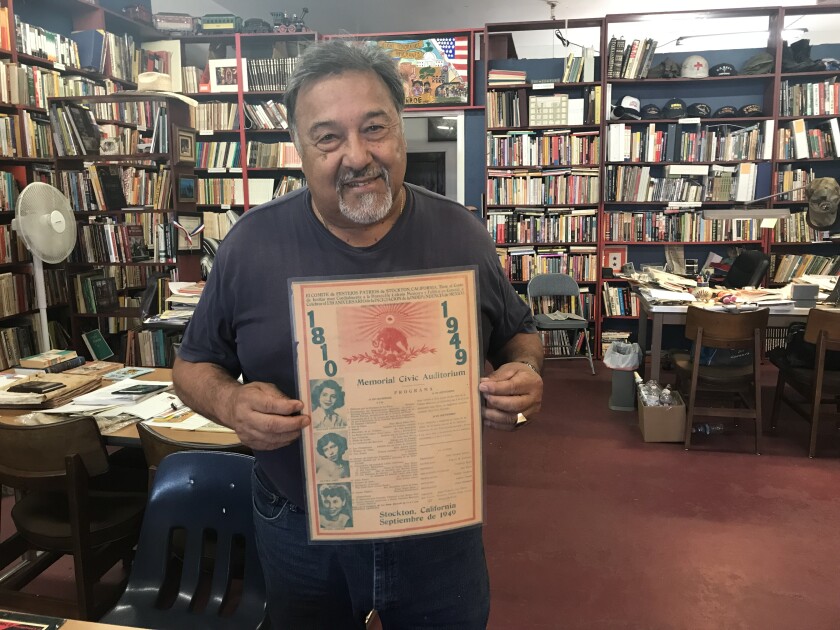Hopefully, we all also have our own libraries in our homes, but this clearly takes it to another level. I'm sure there are multiple treasures on every shelf.
How beautiful and important to be a keeper of the history and knowledge!
-Angela Valenzuela
Newsletter: A Central Valley man’s lifelong quest to build his own Chicano library
 |
Richard Soto holding a book about Ruben Salazar at the Chicano Research Center in Stockton.
(Julia Wick / Los Angeles Times)
|
Good morning, and welcome to the Essential California newsletter. It’s Thursday, Aug. 22, and I’m writing from Stockton.
History usually belongs to the conquerors, or the esteemed academics. But sometimes it also gets told by whoever most carefully corrals all the pieces and wrestles them into place.
The Chicano Research Center, a storefront library on a rundown stretch of Stockton’s east side, is the product of one Central Valley man’s obsessive, expansive quest.
Richard Soto, a 75-year-old, semi-retired educator, has spent the lion’s share of his life quietly building his collection of Chicano literature and history — first as a young man hungry to learn more about his own identity, and later with the dream of someday sharing it with the public like this.
He opened the Chicano Research Center as a nonprofit in 2016. All are welcome to come in, and Soto will probably offer you coffee at the door. He estimates that he has about 20,000 books, journals and ephemera (along with cases of corrido-filled CDs and LPs) housed in this former panaderia.
He built the bookshelves lining every inch of the room himself, with $3,000 worth of pine wood (including his 10% U.S. veteran discount) from Home Depot.
The library is organized according to the self-described “Soto” method, starting with indigenous history in the front corner of the room furthest from his desk, and wrapping all the way around to the present day, with labeled sections based on historical periods and events, individuals and other topics. (The library’s focus includes Mexican history as well as Mexican American history: “One of the things that I learned is that you can’t read Chicano literature, and appreciate and understand it if you don’t know Chicano Mexican history,” Soto explained.)
See also: “Chicano Research Center is freeze-frame into the past” in the Stockton Record]
The walls are brightly punctuated with art, flags, and framed awards and accolades from Soto’s career as an educator, as well as a certificate honoring him for his bravery as a Brown Beret medic during the Chicano Moratorium.

A section of books at the Chicano Research Center in Stockton.
(Julia Wick / Los Angeles)
Soto’s collecting quest began when he was a young man, just back from Vietnam and participating in the Chicano Movement. He went looking for the books that would speak to his story — as a Mexican American born in the United States — but the books he wanted didn’t seem to exist.
“I wanted to know what contributions had we made and what had we done,” Soto said. “And for me, I always wanted to know why people hated me. You know, I pretty much let people alone, but for some reason they had this, I don’t know, hereditary hatred for me.”
During his two years at San Joaquin Delta College, he “found all of maybe five books.” He went to Sacramento State and “found 10 more.” It was only when he left Sacramento for San Francisco that he started to really find what he was looking for, at a now-shuttered progressive bookstore called Modern Times in the Mission District.
After getting his master’s in counseling from San Francisco State, Soto returned to his Central Valley hometown of Tracy, where he worked as a high school counselor for nearly 40 years. He’d loan his students books to learn their history and build their self esteem, parceling out poetry or history or biography depending on what they seemed to need.
“There’s so much beautiful Mexican history. There are so many dynamic Mexican men and women, social political activists that have done something that is just not out there,” he said. “So, I started buying all this stuff.”
Time marched forward and all the while he quietly built his collection, bit by bit. He bought what he could, when he could and stored it where he could. “Everywhere I went, I created a room for all the books.”
When he officially retired, he took another full-time job teaching at an adult school. Suddenly, he had an income and a pension.
“I had a lot of extra money. So I thought man, I’m gonna really hit this,” he recalled. He would turn to the bibliographies in history books and mark off everything he already had, to see what was still missing. Then he would spend a few hours every morning on eBay, looking for discarded library books.

Richard Soto holds an item from his collection — a laminated program from a 1949 event featuring a young Dolores Huerta (then known as Dolores Fernandez) — at his Chicano Research Center in Stockton, Calif.
(Julia Wick / Los Angeles Times)
And finally, he found this space and carefully renovated it to house and share his glorious, sprawling collection.
“Most people, when they come here, they’re overwhelmed,” he said. “They can’t believe that something like this exists.”
I want to help...I'm from Stockton!
ReplyDeleteAwesome! I grew up in Merced, taught in Stockton and now live in Boise, Idaho. I love that Mr. Soto's passion and initiative will help educate others to come. Kudos to him.
ReplyDelete